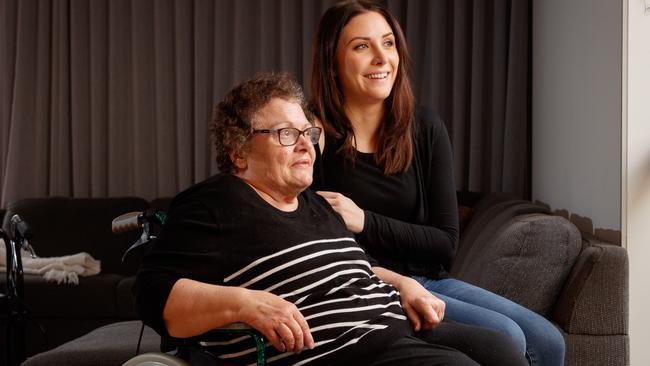Mental health patients could be at risk as program funds cease because of NDIS shift
Thousands of South Australians using mental health programs face being left without support when federal funding runs out, a peak body fears.
SA News
Don't miss out on the headlines from SA News. Followed categories will be added to My News.
Thousands of South Australians using mental health programs face being left without support when federal funding runs out, a peak body fears.
The situation has prompted calls from the Mental Health Coalition of SA for both major parties to commit to ongoing funding for key programs ahead of the election.
The coalition says annual funding of about $40 million will cease on July 1 because the Federal Government expected most users of three programs to transition to the National Disability Insurance Scheme.
However, the coalition says only about 25 per cent of users have moved to the NDIS and fears the remainder will be left without enough support if the programs lapse.
About 400 workers also face losing their jobs, it says.
The Federal Government has allocated more than $121 million to extend the programs for 12 months, to June 30, 2020, but coalition executive director Geoff Harris said that was a “temporary solution”.
A spokeswoman for Health Minister Greg Hunt said users of the programs would “continue to receive equivalent or better support now and in the future” through either the NDIS or other community mental health services.

These have been allocated extra funding which is understood to equate to about $4.1 million a year to June 2022. This will be delivered through SA primary health networks.
Mr Harris said that funding was “just not going to be enough” given the “much lower rates of people getting on to NDIS”.
He said the three programs which will lose funding on July 1 were “highly effective” and offered easier access to support for people “falling through the cracks” of the system.
The Personal Helpers and Mentors program provides people with a support worker, and does not require a formal diagnosis of mental illness.
In contrast, the NDIS requires recipients to have a diagnosed “lifelong” disability.
The Partners in Recovery program provides case management to help people connect to services they may need, while Day to Day Living offers group activities for people with severe mental illness.
Mr Hunt’s spokeswoman said “where possible” operators of those programs would be commissioned to provide support under the new funding model.
Or they could register to become NDIS providers, she said.
In a statement, Labor backed the allocation of an extra 12 months’ funding but did not commit extra money.
There were 24,826 South Australians on the NDIS at December 31, including 669 with a primary mental health or psychosocial disability.
Eleventh-hour reprieve for grandmother

A grandmother with advanced Parkinson’s disease was facing eviction from her care home today before the national disability insurer approved last-minute funding.
Patricia Zahra’s family had been trying for months to secure funding for her to move into a new care home but only received a call from the National Disability Insurance Agency granting approval on Wednesday afternoon.
The call came about two hours after The Advertiser lodged inquiries with the NDIA about the case.
The last-minute reprieve will allow 63-year-old Mrs Zahra to move from respite care to long-term supported accommodation but her daughter Anita Zahra is furious at the delay.
“They left it until two days before she needed to be out of (her current care home) to make a decision,” the 26-year-old said.
“They gave no indication that they were going to extend her funding. It shouldn’t get to this point where people are so desperate for them to start looking at how they’re managing things.” Ms Zahra added her mother received a call yesterday from someone at the NDIA asking her to reconsider speaking to the media now that the issue had been resolved.
“They don’t seem to understand how much stress this has put us under,” she said.
The Zahra family are among a growing number who have contacted The Advertiser as a last resort, only to have their issues resolved following media inquiries.
Mrs Zahra was first granted a 12-month NDIS package in June 2018, to live with her daughter, but began to require more intensive care.
In November last year the family lodged a request for a review of her package. Ms Zahra said repeated calls to the NDIA and complaints to a federal MP and the Commonwealth Ombudsman had not been able to resolve the impasse and the family feared Mrs Zahra would have nowhere to go come today.
On Wednesday, The Advertiser contacted the NDIA about the case. Within hours it rang Ms Zahra to say a new plan had been approved.
Ms Zahra said it allowed her mother to move to a home which the NDIA had previously rejected as too expensive.
In a statement the NDIA said it had “been in ongoing contact” with the Zahra family and a new plan “will be in place prior to Friday”.



